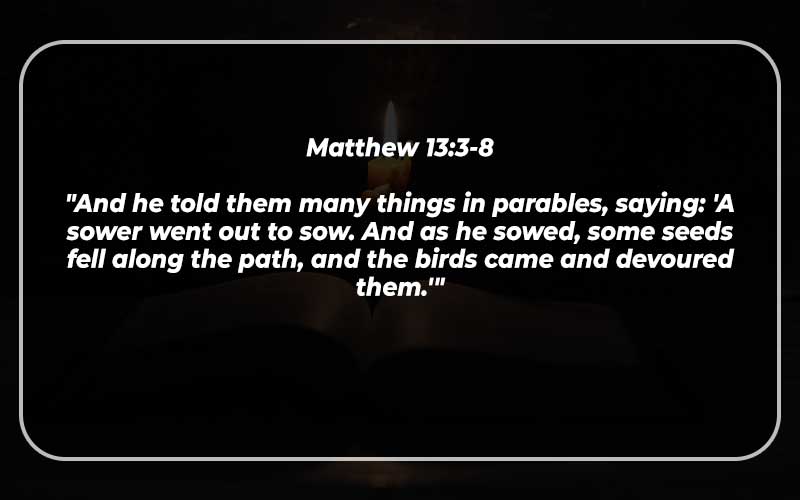The Bible is rich with metaphors and references that resonate with various aspects of life, including the agricultural setting of farming. Through parables, narratives, and poetic expressions, Scripture often draws on the imagery of sowing, reaping, and tending to fields to convey spiritual truths and principles.
This collection presents 30 “Farm Bible Verses” along with commentary, inviting reflection on the spiritual insights found within the context of farming.
Farm Bible Verses
Genesis 8:22
“While the earth remains, seedtime and harvest, cold and heat, summer and winter, day and night, shall not cease.”
This verse, spoken by God after the flood, establishes the enduring cycles of seedtime and harvest as a foundational principle of the natural order.
Matthew 13:3-8
“And he told them many things in parables, saying: ‘A sower went out to sow. And as he sowed, some seeds fell along the path, and the birds came and devoured them.'”
The Parable of the Sower highlights the different responses to the Word of God, emphasizing the importance of fertile hearts for spiritual growth.
Galatians 6:7-8
“Do not be deceived: God is not mocked, for whatever one sows, that will he also reap. For the one who sows to his own flesh will from the flesh reap corruption, but the one who sows to the Spirit will from the Spirit reap eternal life.”
This verse underscores the principle of reaping what is sown, emphasizing the consequences of our choices and actions.
Proverbs 20:4
“The sluggard does not plow in the autumn; he will seek at harvest and have nothing.”
The importance of diligence and timely effort is highlighted, warning against procrastination and laziness in spiritual and earthly endeavors.
Psalm 126:5-6
“Those who sow in tears shall reap with shouts of joy! He who goes out weeping, bearing the seed for sowing, shall come home with shouts of joy, bringing his sheaves with him.”
This psalm beautifully captures the idea that the hardships of sowing will lead to abundant joy during the harvest.
Hosea 10:12
“Sow for yourselves righteousness; reap steadfast love; break up your fallow ground, for it is the time to seek the Lord, that he may come and rain righteousness upon you.”
The call to sow righteousness and break up fallow ground symbolizes the spiritual preparation needed for a fruitful relationship with God.
Mark 4:26-29
“And he said, ‘The kingdom of God is as if a man should scatter seed on the ground. He sleeps and rises night and day, and the seed sprouts and grows; he knows not how.'”
The Parable of the Growing Seed illustrates the mysterious growth of God’s kingdom, emphasizing the divine role in the spiritual development of individuals.
Luke 8:15
“As for that in the good soil, they are those who, hearing the word, hold it fast in an honest and good heart, and bear fruit with patience.”
Jesus explains the significance of a receptive heart in the Parable of the Sower, emphasizing the importance of holding onto God’s Word and bearing fruit patiently.
Jeremiah 4:3
“For thus says the Lord to the men of Judah and Jerusalem: ‘Break up your fallow ground, and sow not among thorns.'”
The metaphor of breaking up fallow ground signifies the need for repentance and removal of obstacles in order to receive God’s Word effectively.
1 Corinthians 3:6-7
“I planted, Apollos watered, but God gave the growth. So neither he who plants nor he who waters is anything, but only God who gives the growth.”
Paul emphasizes the collaborative effort in spiritual planting and watering, recognizing God as the ultimate source of growth.
Amos 9:13
“Behold, the days are coming, declares the Lord, when the plowman shall overtake the reaper and the treader of grapes him who sows the seed; the mountains shall drip sweet wine, and all the hills shall flow with it.”
This prophecy envisions a time of unprecedented abundance, symbolizing God’s blessings and restoration.
Matthew 9:37-38
“Then he said to his disciples, ‘The harvest is plentiful, but the laborers are few; therefore pray earnestly to the Lord of the harvest to send out laborers into his harvest.'”
Jesus encourages prayer for more workers in the spiritual harvest, emphasizing the abundance of souls ready to be reached.

Joel 2:23
“Be glad, O children of Zion, and rejoice in the Lord your God, for he has given the early rain for your vindication; he has poured down for you abundant rain, the early and the latter rain, as before.”
The promise of abundant rain symbolizes God’s blessings and restoration, bringing joy and vindication to His people.
Proverbs 27:23-24
“Know well the condition of your flocks, and give attention to your herds, for riches do not last forever; and does a crown endure to all generations?”
This proverb emphasizes the importance of diligent stewardship and the transient nature of material wealth.
Isaiah 28:24-26
“Does he who plows for sowing plow continually? Does he continually open and harrow his ground? When he has leveled its surface, does he not scatter dill, sow cumin, and put in wheat in rows and barley in its proper place, and emmer as the border?”
The agricultural practices described here reflect the wisdom of planning and orderliness in various aspects of life.
John 4:35-36
“Do you not say, ‘There are yet four months, then comes the harvest’? Look, I tell you, lift up your eyes, and see that the fields are white for harvest. Already the one who reaps is receiving wages and gathering fruit for eternal life, so that sower and reaper may rejoice together.”
Jesus urges His disciples to recognize the immediacy of the spiritual harvest and the joy shared between those who sow and those who reap.
2 Timothy 2:6
“It is the hard-working farmer who ought to have the first share of the crops.”
Paul uses the analogy of a hard-working farmer to illustrate the principle of deserving a share in the fruits of one’s labor.
Psalm 67:6
“The earth has yielded its increase; God, our God, shall bless us.”
This psalm acknowledges God’s role in the agricultural yield and expresses confidence in His ongoing blessings.
Jeremiah 12:13
“They have sown wheat and have reaped thorns; they have tired themselves out but profit nothing. They shall be ashamed of their harvests because of the fierce anger of the Lord.”
The consequences of unfaithfulness and disobedience are portrayed through the metaphor of reaping thorns despite diligent labor.
James 5:7
“Be patient, therefore, brothers, until the coming of the Lord. See how the farmer waits for the precious fruit of the earth, being patient about it, until it receives the early and the late rains.”
James encourages patience by drawing a parallel between the farmer’s patience for the harvest and believers’ endurance as they await the Lord’s return.
Psalm 85:12
“Yes, the Lord will give what is good, and our land will yield its increase.”
A declaration of confidence in God’s goodness and the expectation of a bountiful yield from the land.
Ecclesiastes 11:4
“He who observes the wind will not sow, and he who regards the clouds will not reap.”
This proverb emphasizes the risk and uncertainty that can hinder productivity when excessive caution is exercised.
Isaiah 55:10-11
“For as the rain and the snow come down from heaven and do not return there but water the earth, making it bring forth and sprout, giving seed to the sower and bread to the eater, so shall my word be that goes out from my mouth; it shall not return to me empty, but it shall accomplish that which I purpose, and shall succeed in the thing for which I sent it.”
The analogy of rain and snow nourishing the earth is used to illustrate the effectiveness and fulfillment of God’s Word.
Matthew 13:24-30
“He put another parable before them, saying, ‘The kingdom of heaven may be compared to a man who sowed good seed in his field.'”
The Parable of the Wheat and the Tares underscores the coexistence of good and evil in the world, emphasizing God’s ultimate judgment.
Psalm 126:6
“He who goes out weeping, bearing the seed for sowing, shall come home with shouts of joy, bringing his sheaves with him.”
This verse, echoing Psalm 126:5, emphasizes the transformative journey from weeping during sowing to joyous reaping.
2 Samuel 23:4
“He dawns on them like the morning light, like the sun shining forth on a cloudless morning, like rain that makes grass to sprout from the earth.”
Describing the righteous ruler, this verse uses the imagery of the sun and rain bringing forth life, symbolizing the positive impact of godly leadership.
Proverbs 10:5
“He who gathers in summer is a prudent son, but he who sleeps in harvest is a son who brings shame.”
This proverb contrasts the wisdom of diligent work during harvest with the shame of laziness.
Jeremiah 24:7
“I will give them a heart to know that I am the Lord, and they shall be my people and I will be their God, for they shall return to me with their whole heart.”
God’s promise to give His people a new heart connects with the theme of cultivating fertile ground for spiritual growth.
Joel 2:32
“And it shall come to pass that everyone who calls on the name of the Lord shall be saved. For in Mount Zion and in Jerusalem there shall be those who escape, as the Lord has said, and among the survivors shall be those whom the Lord calls.”
Joel’s prophecy foretells salvation and deliverance, emphasizing the importance of calling on the Lord for refuge.
Revelation 14:14-16
“Then I looked, and behold, a white cloud, and seated on the cloud one like a son of man, with a golden crown on his head, and a sharp sickle in his hand.”
The imagery of a harvest, with the Son of Man wielding a sickle, symbolizes the final judgment and separation of the righteous and the wicked.

